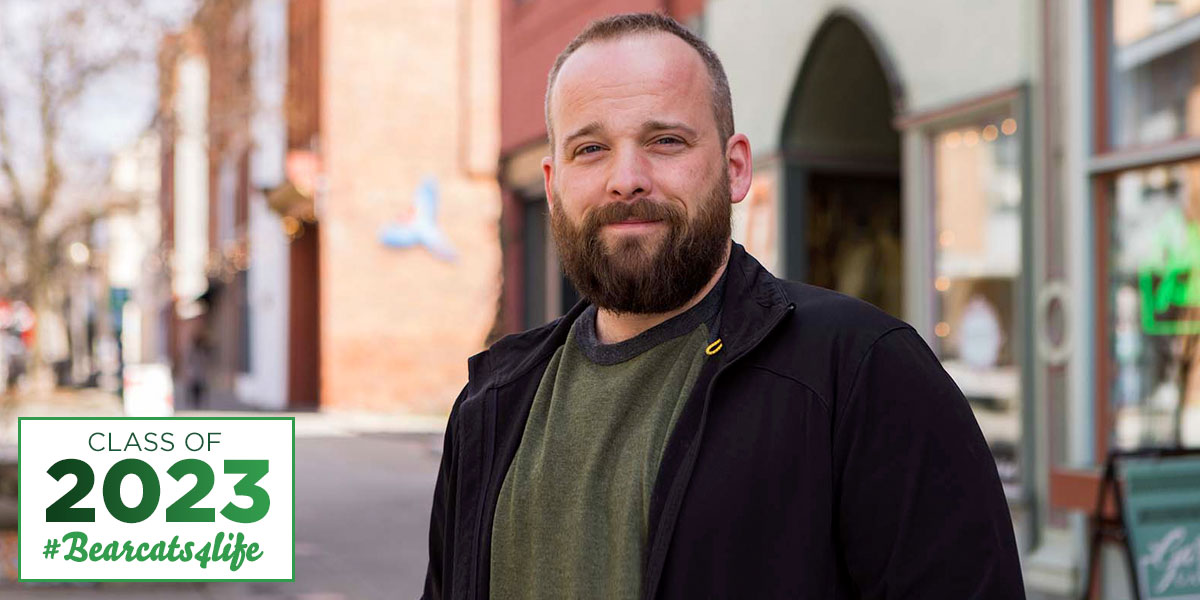Harpur grad took first steps toward law degree while balancing career as a Binghamton police officer
John "Jack" Chapman followed father's career path in law enforcement before aspiring to become an attorney

Following in his father’s footsteps as a Binghamton police officer, John “Jack” Chapman quickly discovered his interest in law enforcement didn’t just lie in the daily road patrol duties that resulted in arrests, traffic citations or any number of other emergency calls.
What fascinated him even more were the complex legal questions that arise from within the criminal justice system.
Eager to build upon what he learned in training for how to testify as a police witness and two years after joining the police department in 2015, Chapman set his sights on becoming a criminal attorney. His first hurdle was figuring out the best way to get started.
Chapman already held an associate degree, but he couldn’t begin seeking out law schools until he earned his bachelor’s degree. He continued working full-time as a police officer and took his undergraduate courses one by one. In May, the 33-year-old Broome County, N.Y., native’s six-year academic journey at Binghamton University reached its end with a bachelor’s degree in philosophy, politics and law from Harpur College of Arts and Sciences.
“I’ve always been really fascinated by the philosophical question of how our society defines punishment and what it’s used for, as a public policy issue,” Chapman said. “When it comes to things you deal with in the criminal justice system, issues surrounding culpability or intent, I can’t think of any field of public policy or career that allows you to tackle such philosophically interesting questions.”
In 2017, Chapman began exploring how to earn an undergraduate degree at Binghamton. Once he zeroed in on pursuing the Philosophy, Politics and Law program, he contacted Anthony Reeves, chair and associate professor of philosophy, about beginning the process to apply as a transfer student.
Chapman said the prospect of completing his undergraduate degree part-time felt a bit daunting at first, but he appreciated the flexibility Binghamton afforded him to take one or two classes per semester while balancing his work schedule in the police department.
“There’s no reason to think you can only do this if you’re between the ages of 18 and 20,” Chapman said. “Anyone who might be thinking about going back to school later in life should know there’s challenges, but you can absolutely make it work.”
One of the most difficult aspects of studying philosophy is the patience it requires to work through ideas to construct focused arguments, Reeves said, but Chapman brought an impressive level of thoughtfulness and dedication as a student in the program while balancing a demanding full-time job.
“His sincere curiosity about philosophical questions was always evident and he always — draft after draft, conversation after conversation — displayed a keen engagement with deeply puzzling conceptual and normative problems,” Reeves said. “I think he will shine in law school and be a fantastic attorney.”
While Chapman views the work of law enforcement largely as providing a deterrent for criminal conduct, perhaps even more rewarding are the opportunities to connect people with help when they need it most.
“One of the limitations you sometimes encounter as a police officer is that everything sort of feels like an imperfect solution,” he said. “But when you have an opportunity to really help, that’s very rewarding.”
After graduation, Chapman plans to continue working as a police officer in Binghamton while taking a year off from school as he weighs options for where to pursue a law degree.
“There’s a lot of misconceptions about the criminal justice system and policing,” Chapman said, “but my experience working in law enforcement so far has given me a greater general sense of why police might do the things they do and why people might end up in the legal system to begin with.”

